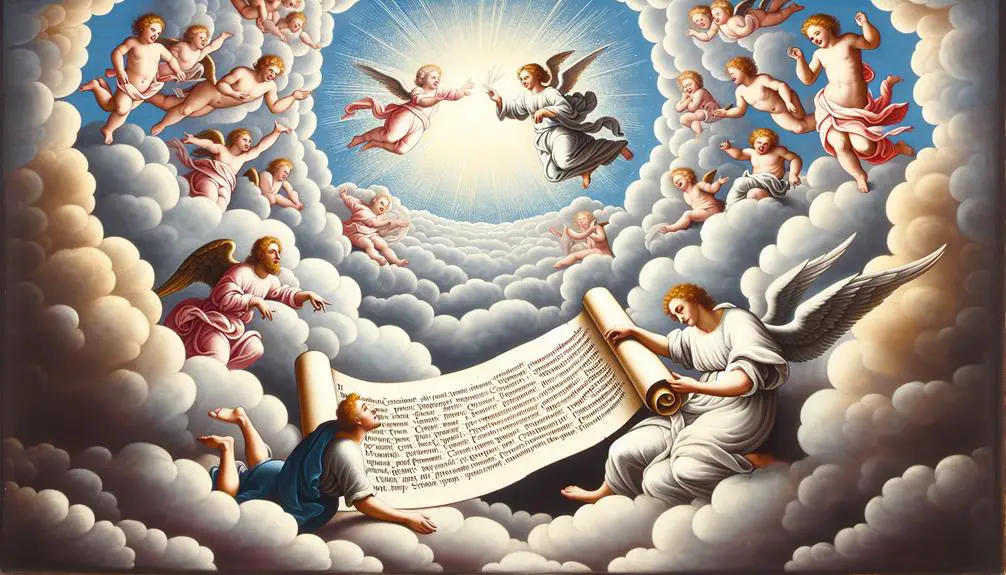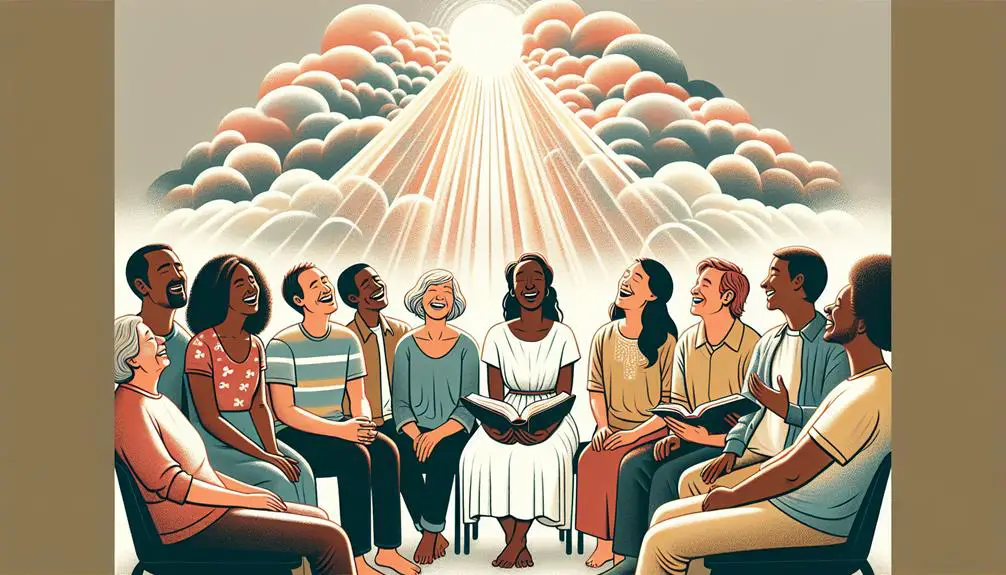Uncover the divine laughter in the Bible, revealing God's multifaceted nature and its profound implications for believers.

God's Laughter in the Bible
When you wander through the winding words of the Bible, you'll uncover the unexpected: instances of divine laughter. This laughter, from joyous jubilation in Psalms to the mocking mirth found in Proverbs, offers a multifaceted glimpse into the nature of God.
It's in the laughter of the Almighty that you find a deeper understanding of His relationship with humanity, His wisdom, and His response to the folly of men. But what does this laughter mean for you as a believer? Let's explore the nuances and implications of these moments, inviting a reflection on how they shape our understanding of the divine.
Key Takeaways
- Divine laughter in the Bible showcases God's joy, judgment, and sovereignty over creation.
- Laughter serves as a multifaceted communication tool, revealing deeper truths about God's relationship with humanity.
- Instances of divine laughter in scripture highlight moments of fulfillment, irony, and prophetic insight.
- Understanding divine laughter enriches spiritual insight, providing lessons on humility, trust, and the complexity of divine-human interactions.
The Concept of Divine Laughter

The concept of divine laughter in the Bible reveals a multifaceted aspect of God's interaction with humanity, inviting you to explore the depth of its theological implications. Laughter, within the scriptural context, isn't merely an expression of mirth but holds profound significance, reflecting God's sovereignty, judgment, and the ultimate realization of divine promises. The origins of laughter, when traced back to biblical narratives, uncover layers of meaning that transcend the mere act of laughing. It's an emblematic gesture that encapsulates joy, derision, and sometimes, a forewarning of divine retribution.
Cultural perceptions of laughter have evolved significantly over the millennia, yet the biblical portrayal of divine laughter remains a constant, urging you to delve into its timeless relevance. In ancient cultures, laughter was often associated with folly or disrespect. However, when attributed to the Divine, it assumes a paradoxical role—both comforting and formidable. This duality reflects the complexity of God's relationship with humanity, where laughter can be a sign of favor or a harbinger of judgment.
Analyzing divine laughter encourages a deeper understanding of its implications in a religious context. It's not an expression taken lightly. Instead, it's laden with messages, each serving a distinct purpose in God's interaction with the world. The biblical instances where God laughs challenge the conventional understanding of laughter, urging a reconsideration of its role in divine communication.
As you ponder the significance of divine laughter, you're drawn into a deeper contemplation of its implications on faith and the human-divine relationship. It's a journey that not only enlightens but also enriches your spiritual perspective.
Laughter in Psalms: Joy and Mockery

In the Psalms, you encounter a rich tapestry of emotions, where joyous praise and divine mockery coexist, reflecting the multifaceted nature of God's interactions with humanity.
You'll observe how joyful praise serves as a testament to God's goodness and mercy, a theme recurrent throughout this sacred poetry. Simultaneously, instances of divine mockery act as poignant reminders of God's sovereignty and the folly of opposing His will, offering a profound exploration of the divine-human relationship.
Joyful Praise in Psalms
Exploring Psalms reveals a rich tapestry of joy and mockery, where laughter serves as both a divine celebration and a means of scorn. Within this collection, joyful praise is intricately woven through verses that elevate musical worship and communal rejoicing.
This form of laughter isn't simply an expression of mirth but a profound acknowledgment of divine grace and sovereignty. Through the act of singing, playing instruments, and gathering together, the faithful participate in a sacred ritual that transcends mere happiness, touching the divine.
This communal aspect of worship, highlighted in the Psalms, emphasizes not only individual joy but a collective, spiritual exultation. Thus, laughter in this context becomes a multifaceted expression of faith, unity, and reverence towards God.
Divine Mockery in Psalms
Shifting focus from the joyful exuberance of communal worship, we encounter another dimension of laughter in Psalms: divine mockery. This facet isn't about mirth but a profound, sobering lesson on divine justice and sovereignty.
- Mocking Foes: God's laughter serves as a stark rebuke to the arrogance of nations and individuals who oppose His will.
- Rebuking Wickedness: Through divine mockery, Psalms vividly illustrate the futility of wickedness in the face of God's eternal truth.
- Asserting Sovereignty: The laughter of God underscores His ultimate authority over creation, dismissing human pride and rebellion as fleeting.
- Promising Justice: This mockery isn't cruel but a promise of justice, ensuring that righteousness prevails, and evil is rightfully admonished.
Each aspect invites reflection on our place within God's cosmic order, urging us to align with His righteousness.
Proverbs: Wisdom and Irony

Delving into Proverbs, you encounter a unique blend of wisdom and irony that challenges conventional understanding. This book of the Bible stands as a testament to the complex nature of divine wisdom, often presenting ideas that, on the surface, seem straightforward but reveal deeper, more nuanced truths upon reflection. The concept of 'foolish wisdom' and 'ironic outcomes' permeates its verses, illustrating the paradoxical ways in which God's wisdom often manifests.
You see, Proverbs teaches that wisdom isn't always where you expect to find it, and the outcomes of our actions can be ironic, defying our human expectations. It suggests that what's considered wise in human eyes may indeed be foolishness in the divine perspective. This realization leads you to a deeper appreciation of the divine orchestration of life's events, where irony serves as a tool to reveal the limits of human understanding and the boundlessness of God's wisdom.
As you further analyze Proverbs, you're encouraged to look beyond the surface, recognizing that wisdom often comes in unexpected forms. The book challenges you to reconsider your perceptions of wisdom and folly, inviting a contemplation on the divine sense of irony in the unfolding of human affairs. Through its verses, Proverbs imparts a reverent acknowledgment of God's supreme intelligence and the mysterious ways in which it's exercised, often beyond human comprehension.
In this exploration of Proverbs, you're not just reading ancient texts; you're engaging with a divine dialogue that enriches your understanding of wisdom, irony, and the profound ways they intertwine in the tapestry of life guided by God's hand.
Laughter in Job: Challenge and Response

You'll find that in the Book of Job, laughter serves as a multifaceted symbol, revealing layers of meaning within the narrative. Job's despair isn't merely mocked; it's juxtaposed with divine irony, unveiling a profound commentary on the human condition and our understanding of the divine.
This literary device highlights human limitations, inviting readers to reflect on the complexity of divine-human interactions and the mysteries that lie beyond our comprehension.
Job's Despair Mocked
In the Book of Job, laughter emerges not as a symbol of joy but as a mocking response to Job's profound despair, challenging the reader to reconsider the complexity of divine interaction. This mocking laughter, rather than diminishing Job's resilience, underscores the enigmatic nature of suffering's purpose. Consider these insights:
- Job's resilience shines brighter against the backdrop of mockery, revealing a steadfast faith.
- Laughter as mockery serves to highlight the gravity of Job's trials, rather than belittle his pain.
- The contrast between human and divine perspectives on suffering is sharply drawn.
- This narrative invites you to ponder the depths of your understanding of divine justice and compassion.
In this light, mockery transcends mere ridicule, becoming a profound catalyst for reflection on the human condition.
Divine Irony Unveiled
Exploring further, we uncover the layers of divine irony in the laughter woven through the narrative of Job, challenging conventional interpretations and inviting a deeper response.
This unexpected humor reveals ironic outcomes, where the very essence of God's interaction with Job transcends mere mockery, embodying a profound teaching mechanism.
It's through these divine jests that the narrative deftly illustrates the complexity of God's relationship with humanity, juxtaposing omnipotence with a form of communication steeped in paradoxes.
The laughter in Job doesn't belittle but elevates, turning despair on its head to highlight a deeper truth.
This divine irony, then, serves as a mirror, reflecting the multifaceted ways in which the sacred engages with the secular, guiding us towards enlightenment with a gentle, yet unmistakable, nudge.
Human Limitations Highlighted
One confronts the stark revelation of human limitations when delving into the laughter echoed in Job's narrative, presenting a divine challenge that prompts profound introspection. This laughter not only highlights the human frailty but also underscores the profound Divine patience with humanity's quest for understanding.
- Human Frailty: It reminds us of our finite understanding and vulnerabilities.
- Divine Patience: Demonstrates God's enduring compassion in the face of our questions and doubts.
- Call for Humility: Encourages a humble approach to divine mysteries beyond our comprehension.
- Invitation to Trust: Suggests that faith requires trusting in God's wisdom, even when His ways are inscrutable.
In this light, God's laughter serves as a gentle, yet powerful, reminder of our place in the cosmos.
Divine Laughter in Prophecy

Analyzing divine laughter in prophecy reveals how this motif serves not only as a form of divine communication but also underscores the inevitable triumph of God's will. When you delve into the laughter origins within biblical texts, it becomes evident that this phenomenon is deeply entwined with prophecy humor. This unique blend of elements serves as a powerful tool through which the divine perspective on human arrogance and folly is communicated. It's not merely about mocking or derision; rather, it's a profound assertion of sovereignty and a reminder of the ultimate futility of opposing God's plans.
Aspect |
Description |
Significance |
|---|---|---|
Context |
Divine laughter often occurs in prophetic narratives where human actions conflict with divine will. |
It highlights the gap between human understanding and God's omniscience. |
Purpose |
Serves to underscore the certainty of God's plans coming to fruition, despite human resistance. |
Reinforces the idea that divine providence cannot be thwarted by human endeavors. |
Effect |
Instills a sense of humility and awe in believers, reminding them of their place in the divine order. |
Encourages reflection on one's actions and alignment with divine will. |
In this light, divine laughter in prophecy isn't just an expression of joy or amusement. It's a complex, multifaceted phenomenon that communicates God's unassailable authority and the eventual realization of His will. It's a sobering reminder that, in the grand scheme of things, human efforts to counter divine plans are not only futile but also somewhat comical from a divine perspective. Through this lens, one can appreciate the depth and nuance of prophecy humor as a reflection of divine wisdom and sovereignty.
Understanding God's Joyful Moments

Delving into God's joyful moments in the Bible unveils a dimension of divine interaction that transcends mere amusement, revealing a profound sense of satisfaction in the fulfillment of His will. When you explore these narratives, you're not just reading ancient texts; you're uncovering the layers of laughter theology and the essence of a humorous faith that resonates through the ages.
To grasp the depth of these moments, consider the following:
- Creation's Completion: The joy God expresses at the culmination of creation (Genesis 1:31) isn't merely contentment but a jubilant approval of His work's perfection and goodness. This reflects a divine laughter that celebrates the harmony and potential of His creation.
- Covenant with Abraham: In the promise to Abraham about Sarah's pregnancy (Genesis 18:12-15), there's a nuanced interplay of disbelief, joy, and divine humor. God's reassurance to them underscores a laughter that bridges faith and doubt, embodying a humorous faith in the face of impossibility.
- Deliverance of Israel: The exodus and subsequent victories of Israel (Exodus 15:1-21) showcase God's laughter as an expression of jubilation over the liberation of His people. It's a laughter that mocks the oppressors and celebrates the triumph of justice and freedom.
- Restoration of Jerusalem: The return of the exiles and the rebuilding of Jerusalem (Nehemiah 8:10) highlight laughter and joy as central to worship and community life. This embodies a laughter theology that sees joy as a strength and a testament to God's faithfulness and restoration.
These moments encapsulate a divine laughter that's both profound and pervasive, inviting you to experience the richness of a faith filled with humor and joy.
Implications of Laughter for Believers

Reflecting on God's laughter throughout the Bible naturally leads us to consider its profound impact on believers' lives and spirituality. Laughter, often perceived merely as a response to humor, holds deeper spiritual significance when viewed through the lens of faith. It embodies a divine joy that transcends earthly troubles, offering believers a glimpse into the eternal happiness promised by faith.
Incorporating laughter into one's spiritual practice isn't about dismissing the seriousness of life's challenges but rather, it's about embracing a divine perspective that sees beyond the present struggles. Laughter therapy, a concept well-acknowledged in the secular world for its psychological benefits, finds a remarkable parallel in spiritual contexts. It acts as a therapeutic balm, healing the weary soul and reminding believers of God's ultimate sovereignty over life's turmoil.
Moreover, laughter fosters spiritual happiness by knitting communities of faith closer. Shared laughter becomes a testament to a collective hope and trust in God's plan, reinforcing the bonds within the body of Christ. It's a celebration of God's goodness, a communal affirmation of faith that strengthens individual and collective resilience against despair.
Thus, laughter, as depicted in the Bible, isn't an escape from reality but a sacred tool that enhances spiritual well-being. It encourages believers to view life through a lens of faith, where every moment of joy is a reflection of divine love and every chuckle a whisper of God's comforting presence in the midst of trials. In embracing laughter, believers find a profound source of spiritual happiness and a powerful antidote to the heaviness of life.
Frequently Asked Questions
How Has the Interpretation of God's Laughter Evolved Over Different Historical Periods and Within Various Christian Denominations?
You're exploring how interpretations of laughter symbolism have shifted across historical contexts and among Christian denominations. This evolution reflects deeper understandings and theological debates.
Initially, you might find it depicted as a sign of divine judgment or joy, but as you delve into various periods and beliefs, it's clear the nuances are vast.
Scholars and theologians have continually reevaluated this concept, aligning it with broader societal changes and theological insights.
Can Instances of Divine Laughter Be Found in Religious Texts Outside the Bible, Such as the Qur'an or the Bhagavad Gita, and How Do They Compare?
You're exploring if divine emotions, specifically laughing deities, appear in texts outside the Bible, like the Qur'an or Bhagavad Gita.
This comparison sheds light on how different religious traditions perceive divine laughter.
While the Bible presents certain instances, other scriptures also reflect on laughing deities, offering a rich tapestry of divine emotions.
Analyzing these can reveal how various faiths understand and depict the complexity and depth of divine interactions with humanity.
How Do Contemporary Theologians Reconcile the Concept of Divine Laughter With the Suffering and Evil Present in the World?
You're delving into how laughter theology and divine humor are interpreted by contemporary theologians amidst global suffering and evil. They often argue that divine laughter isn't mockery but a complex expression of joy, justice, or even sorrow.
It's seen as a way for the divine to communicate beyond human understanding, offering hope and resilience. This perspective bridges the gap between human suffering and the seemingly paradoxical concept of a joyful divine.
In What Ways Has the Notion of God's Laughter Influenced Christian Art, Literature, and Music Throughout the Centuries?
You'll find that laughter's symbolism deeply roots itself in artistic representations, shaping Christian art, literature, and music over centuries.
This notion fosters a unique blend of joy and reverence, prompting artists and writers to explore divine joy through their works.
From medieval paintings to modern hymns, the concept weaves through various forms, offering a nuanced perspective on spirituality and divinity, enriching the cultural fabric with layers of meaning and emotion.
Are There Any Psychological Studies on the Impact of Understanding Divine Laughter on an Individual's Faith and Mental Well-Being?
You're exploring whether laughter therapy influences faith resilience and mental well-being without directly mentioning divine mirth. Studies suggest that understanding joy and humor in spirituality can bolster mental health and deepen faith.
This intersection of laughter therapy and faith resilience offers a unique perspective on spiritual well-being. Analyzing these studies, you'll find that integrating humor with spirituality can significantly enhance an individual's resilience, providing a deeper, more nuanced connection to their beliefs.
Conclusion
In exploring the laughter of God through the Bible, you've journeyed from the joyous echoes in Psalms to the ironic smiles in Proverbs, faced the challenges within Job's tale, and felt the prophetic chuckles of divine foresight.
This laughter, a tapestry of joy, mockery, wisdom, and irony, invites you to reflect on the multifaceted nature of the divine. For believers, it's a call to embrace wisdom, understand adversity, and find joy in the divine presence, shaping a deeper, more nuanced faith.



Sign up